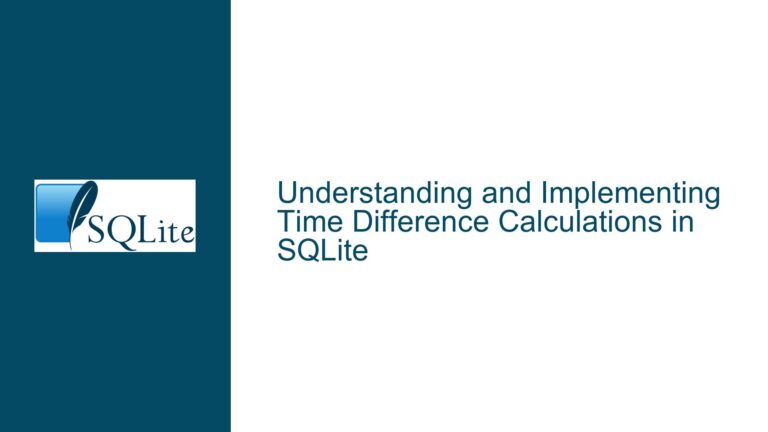Retrieving Books by Exact Keyword Matches in SQLite
Understanding the Schema and Query Requirements
The core issue revolves around retrieving book titles from an SQLite database that match a specific set of keywords exactly. The database schema consists of three main tables: Books, Keywords, and Authors. The Books table contains details about each book, including its title, publication year, and author. The Keywords table associates keywords with specific books via a titleid foreign key. The Authors table stores author information, linked to books through an authorid.
The primary challenge is to construct a query that retrieves books which match exactly a given set of keywords, without including books that have additional keywords beyond the specified set. This requires a deep understanding of SQLite’s capabilities in handling complex queries involving joins, subqueries, and aggregate functions.
Exploring the Challenges in Keyword-Based Book Retrieval
The initial attempts to solve the problem involved using the IN and LIKE operators, which yielded inconsistent results. The IN operator is useful for checking if a value matches any value in a list, but it does not account for the exactness required in this scenario. The LIKE operator, while powerful for pattern matching, is not suitable for exact keyword matching, especially when the keywords are stored in a separate table.
The crux of the issue lies in the need to ensure that the books retrieved not only contain all the specified keywords but also do not contain any additional keywords. This dual requirement complicates the query construction, as it necessitates a mechanism to count and compare the number of keywords associated with each book.
Crafting the Perfect Query for Exact Keyword Matching
To address the challenge, several approaches were proposed. The first approach involved grouping the keywords by titleid and using the HAVING clause to filter groups that contain exactly the specified number of keywords. However, this approach only ensures that the books have at least the specified keywords, not exactly those keywords.
A refined approach was suggested, which involves using aggregate functions to count both the matching and non-matching keywords. This method ensures that the books retrieved have exactly the specified keywords and no others. The query uses the SUM function with conditional expressions to count the occurrences of matching and non-matching keywords, providing a precise filter for the exact keyword match requirement.
Another approach involved joining the Books table with multiple instances of the Keywords table, each representing one of the specified keywords. This method ensures that each join condition corresponds to one of the required keywords, effectively filtering out books that do not match all the specified keywords. However, this approach can become cumbersome when dealing with a large number of keywords, as it requires a separate join for each keyword.
Implementing the Solution in a Real-World Scenario
In a real-world application, such as a website with a search feature, the ability to retrieve books based on exact keyword matches is crucial for providing accurate search results. The solution involving aggregate functions and conditional counting is particularly effective in this context, as it scales well with an increasing number of keywords and books.
To implement this solution, the query can be dynamically generated based on the user’s input, ensuring that the search results are always relevant and precise. This approach not only enhances the user experience but also optimizes the database query performance by minimizing the number of joins and ensuring that only the necessary data is retrieved.
Optimizing the Query for Performance and Scalability
While the proposed solutions effectively address the core issue, it is essential to consider their performance implications, especially in a large database with thousands of books and keywords. Indexing the titleid and keyword columns in the Keywords table can significantly improve query performance by reducing the time required to search and match keywords.
Additionally, using prepared statements and parameterized queries can enhance the security and efficiency of the search feature, preventing SQL injection attacks and reducing the overhead associated with query parsing and compilation.
Conclusion: Mastering Exact Keyword Matching in SQLite
Retrieving books based on exact keyword matches in SQLite requires a nuanced understanding of the database schema, SQLite’s query capabilities, and the specific requirements of the application. By leveraging aggregate functions, conditional counting, and strategic indexing, it is possible to construct efficient and accurate queries that meet the exact keyword matching criteria.
This comprehensive approach not only solves the immediate problem but also provides a robust foundation for handling similar challenges in the future, ensuring that the database remains a reliable and powerful tool for managing and retrieving complex data.






